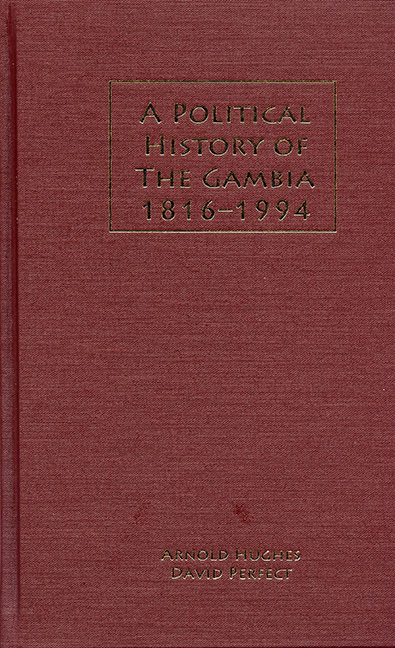Book contents
- Frontmatter
- Dedication
- Map
- Contents
- List of Tables
- List of Interviewees
- Acknowledgments
- Abbreviations
- Introduction
- 1 Social and Economic Setting
- 2 Constitutional Change in The Gambia, 1816–1994
- 3 Merchants and Recaptives: The Origins of Modern Politics, 1816–86
- 4 Patrician Politics in the Era of the Forsters, 1886–1941
- 5 The Establishment of Party Politics, 1941–59
- 6 The “Green Uprising”: The Emergence of the People's Progressive Party, 1959–65
- 7 Electoral Politics, 1965–81
- 8 Radical and Insurrectionary Political Challenges, 1965–81
- 9 Electoral Politics, 1981–94
- 10 The Gambia's External Relations, 1965–94
- 11 The 1994 Coup and the Jawara Legacy
- Appendix A Major Constitutional Changes, 1816–1994
- Appendix B Legislative Council Election Results, 1947–54
- Appendix C General Election and By-Election Results, 1960–93
- Appendix D Presidential Election Results, 1982–92
- Appendix E Republic Referendum Results, 1970
- Appendix F Primary Sources
- Appendix G Newspapers and Magazines Consulted
- Notes
- Bibliography
- Index
- Rochester Studies in African History and the Diasora
6 - The “Green Uprising”: The Emergence of the People's Progressive Party, 1959–65
Published online by Cambridge University Press: 13 April 2017
- Frontmatter
- Dedication
- Map
- Contents
- List of Tables
- List of Interviewees
- Acknowledgments
- Abbreviations
- Introduction
- 1 Social and Economic Setting
- 2 Constitutional Change in The Gambia, 1816–1994
- 3 Merchants and Recaptives: The Origins of Modern Politics, 1816–86
- 4 Patrician Politics in the Era of the Forsters, 1886–1941
- 5 The Establishment of Party Politics, 1941–59
- 6 The “Green Uprising”: The Emergence of the People's Progressive Party, 1959–65
- 7 Electoral Politics, 1965–81
- 8 Radical and Insurrectionary Political Challenges, 1965–81
- 9 Electoral Politics, 1981–94
- 10 The Gambia's External Relations, 1965–94
- 11 The 1994 Coup and the Jawara Legacy
- Appendix A Major Constitutional Changes, 1816–1994
- Appendix B Legislative Council Election Results, 1947–54
- Appendix C General Election and By-Election Results, 1960–93
- Appendix D Presidential Election Results, 1982–92
- Appendix E Republic Referendum Results, 1970
- Appendix F Primary Sources
- Appendix G Newspapers and Magazines Consulted
- Notes
- Bibliography
- Index
- Rochester Studies in African History and the Diasora
Summary
Until the end of the 1950s, Gambian politics was essentially an urban phenomenon with the four-fifths of the population that lived in the Protectorate being excluded from national politics. However, the promulgation in 1959 of a new constitution, which allocated twelve out of nineteen directly elected seats to the Protectorate, transformed the situation. The People's Progressive Party (PPP), which was specifically founded to give a voice to rural society in national affairs, won more seats than any other party in the first nation-wide election in 1960. Despite suffering a setback when P. S. N'Jie of the rival United Party was appointed chief minister in 1961, it achieved an overall majority in the 1962 election and its leader, D. K. Jawara, was appointed premier. The party strengthened its position after the election, so that by independence in February 1965, it controlled three-quarters of the House of Representatives. The urban parties, in contrast, were by now in terminal decline. Consequently, a “green uprising,” a term coined by Huntington to describe the seizure of power by a rurally based political movement opposed to urban based parties, had taken place in Gambia.
The Origins of the People's Progressive Party
During the 1950s, the number of Mandinka living permanently in Bathurst (and Kombo St. Mary) increased significantly, with the recorded Mandinka population of the Colony rising from 4,115 in 1951 to 6,657 in 1963 (see table 1.5). Most Mandinka remained poorly educated and employed in low status jobs as laborers, petty traders, or domestics, but an increasing minority were now better educated and ambitious to advance themselves in the face of the economic ascendancy and social disdain of the urban literate community. Some of these were alumni of Georgetown's Armitage School. As noted in Chapter 1, Armitage was established in the 1920s to cater for the sons and close relatives of Protectorate chiefs, but after World War II, it increased its enrolment. Others had been “adopted” by Christian or Muslim families in Bathurst and had attended secondary schools in the capital, before obtaining clerical posts in the civil service or in the private sector.
- Type
- Chapter
- Information
- A Political History of the Gambia, 1816–1994 , pp. 134 - 159Publisher: Boydell & BrewerPrint publication year: 2006

